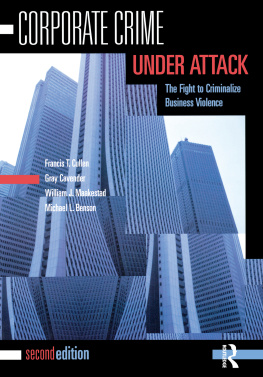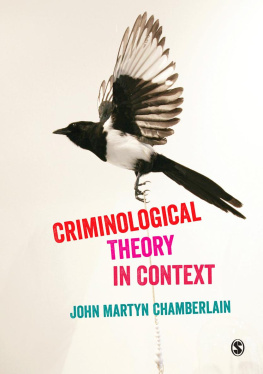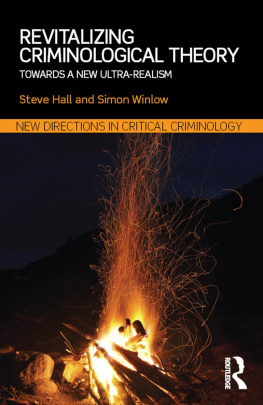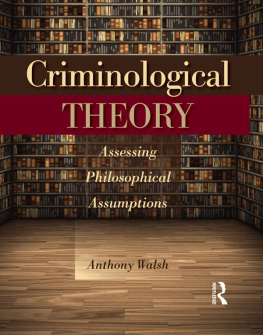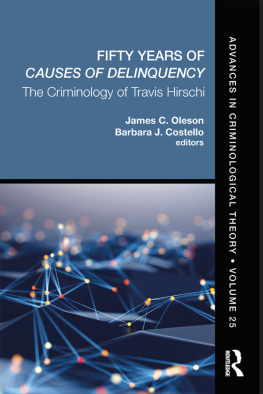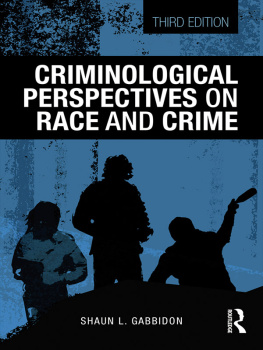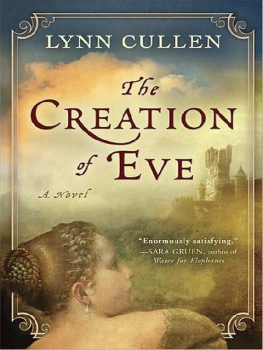Challenging
Criminological
Theory
EDITORS
Freda Adler
University of Pennsylvania
William S. Laufer
University of Pennsylvania
EDITORIAL BOARD
Advances in Criminological Theory
Robert Agnew
Emory University
Ko-Lin Chin
Rutgers University
Albert K. Cohen
University of Connecticut
Francis T. Cullen
University of Cincinnati
Delbert S. Elliott
University of Colorado
David P. Farrington
Cambridge University
James O. Finckenauer
Rutgers University
John H. Laub
University of Maryland
John MacDonald
University of Pennsylvania
Terrie E. Moffit
Duke University
Joan Petersillia
Stanford University
Robert J. Sampson
Harvard University
Kip Schlegel
Indiana University
Lawerence W. Sherman
Cambridge University University of Maryland
David Weisburd
Hebrew University George Mason University
Elmar G. M. Weitekamp
University of Tubingen
Willaim Julius Wilson
Harvard University
Challenging
Criminological
Theory
The Legacy of Ruth Rosner Kornhauser
Advances in Crminological Theory
Volume 19
Francis T. Cullen, Pamela Wilcox
Robert J. Sampson and
Brendan D. Dooley, editors
First published 2015 by Transaction Publishers
Published 2017 by Routledge
2 Park Square, Milton Park, Abingdon, Oxon OX14 4RN
711 Third Avenue, New York, NY 10017, USA
Routledge is an imprint of the Taylor and Francis Group, an informa business
Copyright 2015 by Taylor & Francis..
All rights reserved. No part of this book may be reprinted or reproduced or utilized in any form or by any electronic, mechanical, or other means, now known or hereafter invented, including photocopying and recording, or in any information storage or retrieval system, without permission in writing from the publishers.
Notice:
Product or corporate names may be trademarks or registered trademarks, and are used only for identification and explanation without intent to infringe.
Library of Congress Catalog Number: 2014011921
Challenging criminological theory : the legacy of Ruth Rosner Kornhauser /
Francis T. Cullen, Pamela Wilcox, Robert J. Sampson, and Brendan D. Dooley, editors.
pages cm. (Advances in criminological theory; volume 19)
Includes bibliographical references and index.
ISBN 978-1-4128-5490-0
1. Kornhauser, Ruth Rosner. 2. CriminologistsUnited States. 3. CriminologyUnited States. I. Cullen, Francis T.
HV6023.K67C43 2015
364.092dc23
2014011921
ISBN 13: 978-1-4128-5490-0 (hbk)
Contents
Francis T. Cullen and Pamela Wilcox
Anne M. Kornhauser
Brendan D. Dooley
Ruth Rosner Kornhauser
Travis Hirschi
Robert J. Bursik, Jr.
Ross L. Matsueda
Robert Agnew and Francis T. Cullen
Chester L. Britt and Barbara J. Costello
Charis E. Kubrin
Barbara D. Warner and Robert J. Sampson
Pamela Wilcox and Kenneth C. Land
David S. Kirk and Andrew V. Papachristos
John R. Hipp and Adam Boessen
David F. Greenberg
Darrell J. Steffensmeier and Jeffery T. Ulmer
Cheryl L. Maxson
Francis T. Cullen and Pamela Wilcox
In 1978, Ruth Rosner Kornhauser published Social Sources of Delinquency. This volume was marked by inordinate erudition and proved to have an enduring impact on theoretical criminology. Although not young of ageshe was over 50 years old when the book appearedshe was a newly minted Ph.D. In fact, this book was based closely on her doctoral dissertation, which she had finished in 1975. Due to a debilitating medical condition suffered in that year, she would not publish another major work. Few criminologists would know her.
This volume is intended to honor Ruth Rosner Kornhauser and thus preserve her scholarly legacy. Whether through admiration, opposition, or extension, the chapters that follow show how the ideas expressed in Social Sources of Delinquency continue to shape the criminological enterprise. The first section of this essay briefly tells the story of Ruth Kornhauser and her authorship of Social Sources of Delinquency. The second section provides the plan of the bookhow the five parts of the volume pay homage to and move beyond Ruth Kornhauser's criminology. The remaining sections review three key themes that inform a contemporary analysis of this classic work.
A Criminological Classic
Writing but one major work and lacking the opportunity to train students to serve as apostles for her views, it might have been expected that Ruth Rosner Kornhauser would have slipped quickly from memory. In fact, most prominent authors from the 1970s are infrequently cited by today's criminologists and their classic works are, at most, summarized as snippets in textbooks (Cohn, Farrington, and Iratzoqui 2014). But as this volume in Kornhauser's honor attests, she has not been fated to fall from notoriety to obscurity. Many scholars, including the editors of this volume, keep a copy of Social Sources of Delinquency close at hand. It is common for the text to have been consulted so often that more of the book seems underlined than notoften with different color ink to differentiate different excursions through the work's pages.
Why does Social Sources of Delinquencya work that soon will be four decades oldstill matter? Three considerations help to explain the book's enduring relevance. First, Kornhauser focused on three theoretical models that remain today at the core of criminology: strain theory, differential association/social learning theory (which she termed cultural deviance theory), and control theory (see Agnew and Brezina 2012; Cullen, Wright, and Blevins 2006). These models have developed new variants over time (e.g., Agnew 1992, 2006; Gottfredson and Hirschi 1990), have been combined into integrated theories (e.g., Hawkins et al. 2003; Thornberry 1987), and have been incorporated into the now-major paradigm of life-course/developmental criminology (e.g., Farrington 2005; Sampson and Laub 1993). Accordingly, Kornhauser's subject matter still occupies much criminological interest.
Second, the quality of her assessment of criminological thinking remains unsurpassed. Her intent was not to test competing theories but, as the subtitle of her book proclaims, to provide an appraisal of analytic models. In this project, no workbefore or since Social Sources of Delinquencymatches the sheer brilliance of the theoretical education that Kornhauser provided. The book's text is often dense and requires considerable concentration; it is a volume to be read in small doses and not in a single sitting. But the reader's investment reaps the reward of experiencing a penetrating conceptual analysis based on a masterful synthesis of the extant empirical literature. Her insights remain relevant today, as does her example of how theoretical analysis should be conducted.




